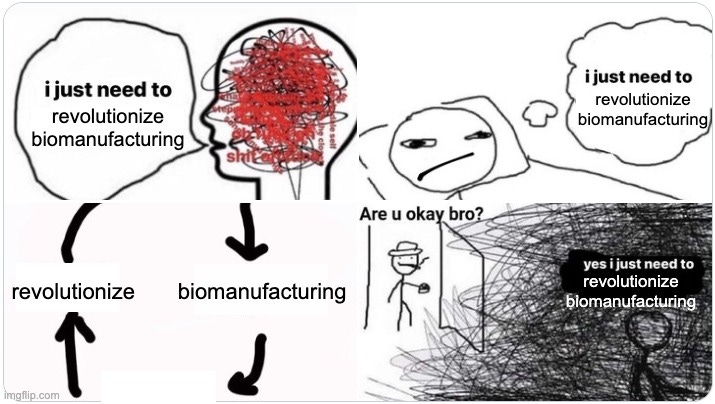10x better fermentation infrastructure at massive scale
The only way to unleash our biomanufactured future
The problem with new biomanufactured products is that, for most, the cost to produce them is substantially higher than incumbent products. They are simply not competitive until they’re at massive scale.
With this in mind, a primary focus over the last five years has been development of novel products with attributes that were supposed to command a higher price. Maybe it’s animal free or vegan, maybe it’s more performant, or, in rare cases, maybe it’s totally new and there is no incumbent product to compare it to.
Totally novel products that can command a high price (ZBiotics being an excellent example) are painfully rare. Most others are trying to displace an incumbent - and doing so on any metric other than lower cost is near impossible. This is especially true in highly cost sensitive, low margin markets, like food.
A lot of companies decided to launch their own brands and go B2C - attempting to drive uptake by going straight to the consumer. Unfortunately, for companies focused on tech development, making branded consumer products turned into a massive distraction. This has been the death of many synbio startups.
At today’s costs, scaling new high risk products even at relatively high $ per kg selling price just doesn’t pencil out. If your new product could in theory sell for $100/kg, but commercial interest is unknown, how can you finance a > $100m production plant to make it? And, if you use a CMO in the interim, the risk capital is simply not there to allow you to burn money on production runs which are 5x-10x more costly than running at a scaled facility.
Bioproducts have to compete on the open market with existing incumbents and the only path forward is to radically improve infrastructure economics.
Companies can’t sell novel bioproducts B2B because they’re too expensive compared to incumbents.
Companies that invent new bioproducts are forced to go B2C and launch their own brands, but they are bad at it.
Scaling up with your own commercial plant is near impossible because of commercial and financing risk, and scaling up using CMOs is not cost effective especially when risk capital is limited.
If companies can displace incumbent products (with low market risk), investment in production capacity is possible, but they can’t do so without reaching price parity.
By my calculus, an order of magnitude improvement to biomanufacturing infrastructure is needed to displace incumbent products in large markets. Improvements at bench and pilot scale are not sufficient: we must martial capital to go big, and go fast. It’s true that there is not enough biomanufacturing capacity to address current and expected demand, but we can’t just build more $100m+ legacy plants - the economics simply do not pencil out. This will not be a game of financial engineering: it will be a game of technological innovation.


When you think about it's ironic how much we've advanced in the last 20 years on synthetic biology (next-gen sequencing, CRISPR, protein eng, etc) while we're still (mostly) using the same foundational tech from the 70s-80s pharma development in biomanufacturing. We're trying to run cutting-edge software on outdated hardware.
Hey Arye! I wonder if you have seen the latest report by Synonym and BCG about biomanufacturing capacity and cost reductions. I think you would enjoy it :) (I'm not affiliated with Synonym!)
https://www.synonym.bio/synonym-bcg-report